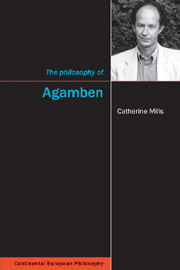Book contents
- Frontmatter
- Contents
- Acknowledgements
- Abbreviations
- Introduction
- 1 Metaphysics: negativity, potentiality and death
- 2 Aesthetics: language, representation and the object
- 3 Politics: biopolitics, sovereignty and nihilism
- 4 Ethics: testimony, responsibility and the witness
- 5 Messianism: time, happiness and completed humanity
- Conclusion
- Notes
- Chronology of major works
- Bibliography
- Index
3 - Politics: biopolitics, sovereignty and nihilism
- Frontmatter
- Contents
- Acknowledgements
- Abbreviations
- Introduction
- 1 Metaphysics: negativity, potentiality and death
- 2 Aesthetics: language, representation and the object
- 3 Politics: biopolitics, sovereignty and nihilism
- 4 Ethics: testimony, responsibility and the witness
- 5 Messianism: time, happiness and completed humanity
- Conclusion
- Notes
- Chronology of major works
- Bibliography
- Index
Summary
In what is perhaps his best-known book, Homo Sacer, Giorgio Agamben takes up the concept of biopower proposed by Michel Foucault to provide a radical reinterpretation of the modern political condition as one of legal abandonment and nihilism. In the final chapter of The History of Sexuality, Foucault argues that the regime of power that emerged from the seventeenth century onwards involved a fundamental reversal of the principle of power's operation. He claims that whereas sovereign power operated on the principle of the right to commit its subjects to death in order to enhance the strength of the sovereign, modern power reverses this axis and works through the administration of life. The entry of life into the mechanisms of power and correlative organization of political strategies around the survival of the species constitutes the “threshold of modernity” for Foucault.
The historical claim that biopolitics emerged during the seventeenth century provides the point of purchase of Agamben's own critical thesis on biopolitics, which he describes as an attempt to “correct or at least complete” Foucault's analysis of the relation between biopolitics and sovereign power. Agamben claims that rather than being characteristic of the modern era, biopolitics and sovereignty articulate in a much more fundamental way, such that the “production of a biopolitical body is the original activity of sovereign power” and “biopolitics is at least as old as the sovereign exception” (HS: 6).
- Type
- Chapter
- Information
- The Philosophy of Agamben , pp. 59 - 80Publisher: Acumen PublishingPrint publication year: 2008

